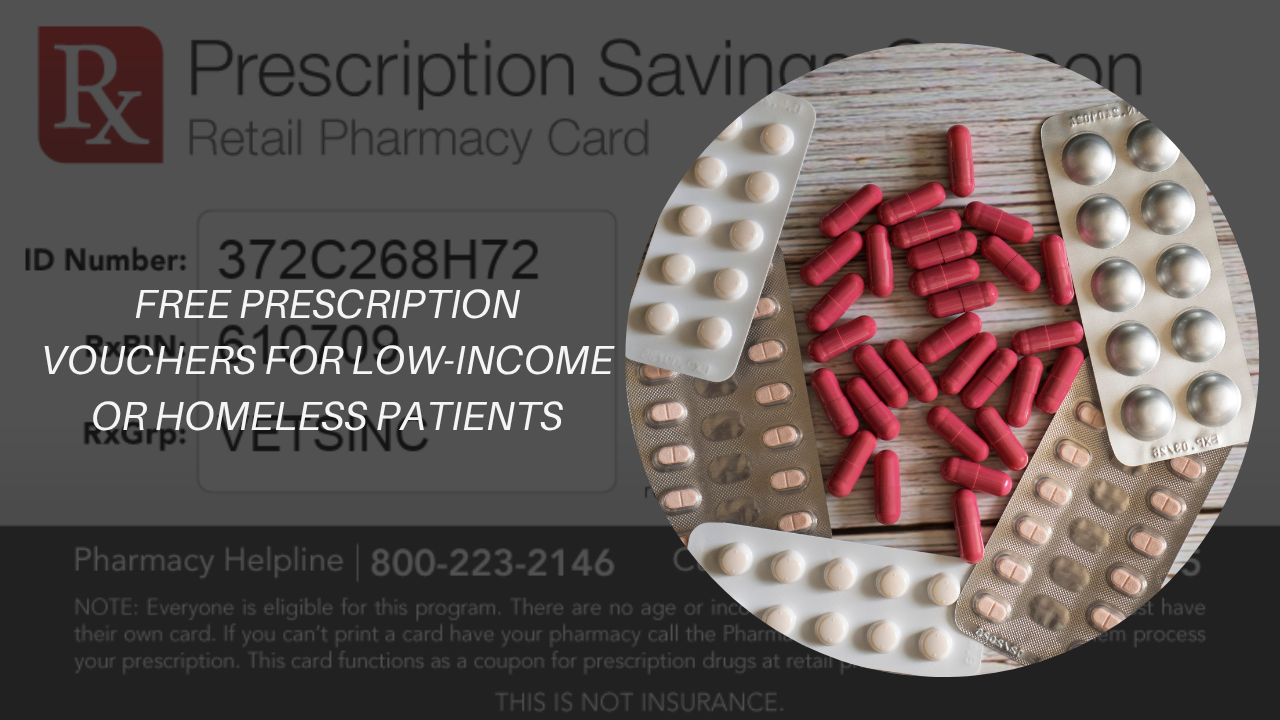Could you really get your prescriptions for free? You may qualify for free (or low-cost) medication.
Prescription vouchers are financial assistance programs that cover all or part of the cost of prescription medicines for people who don’t have health insurance or the resources to pay for them.
Several government programs, nonprofit organizations, and community clinics offer prescription medicine vouchers to help cover the cost of medications for those who cannot afford them.
Who Can Get Free Prescription Vouchers?
Eligibility requirements for prescription vouchers may vary by program, but generally, applicants must meet one or more of the following conditions:
- Have a low income (often below 200% of the Federal Poverty Level)
- Lack health insurance or have insufficient coverage
- Be homeless or living in transitional housing
- Have a chronic illness that requires regular medication
- Demonstrate financial hardship
Some programs may also prioritize seniors, veterans, or people with disabilities who cannot afford their prescription medications.
How to get Free or Low-cost Prescription or Vouchers for Homeless & Low-Income
1. Government Programs That Help With Prescription Drug Costs
Medicaid
Medicaid covers most prescription medicines, especially for low-income individuals, people with disabilities, or people with chronic illnesses. Eligibility varies by state, but generally includes low-income adults, families, seniors, and people with disabilities.
Visit your state’s Medicaid website or HealthCare.gov and submit proof of income, residency, and identity.
If you are homeless, you can use the address of a shelter or local social services office as your mailing address.
Medicare Part D (for seniors and adults with disabilities)
Prescription medicine coverage for Medicare enrollees. Apply for Extra Help through Social Security to lower your premiums and co-pays. Call 1-800-772-1213 or visit ssa.gov/extrahelp
State Pharmacy Assistance Programs (SPAPs)
Some states have their own prescription drug assistance programs for low-income residents. For example:
- New Jersey Pharmacy Assistance for the Elderly and Disabled (PAAD)
- New York State Pharmacy Coverage for the Elderly (EPIC)
- Illinois Cares Rx (for low-income seniors)
Visit your state health department website or ncoa.org for a complete list.
2. Free Prescription Drug Vouchers and Patient Assistance Programs
Prescription Drug Assistance Alliance (PPA)
A free service that connects patients with more than 475 public and private prescription drug assistance programs that offer free or low-cost medications to eligible individuals. Proof of income and lack of health insurance coverage is generally required.
Website: www.pparx.org
NeedyMeds
Helps patients find free or discounted medications and provides printable discount cards. You’ll get up to 80% off retail prices at most major pharmacies.
Website: www.needymeds.org
RxAssist
A database of manufacturer-sponsored patient assistance programs that provide free or reduced-price medications. You can easily search by medication name to find available assistance programs.
Website: www.rxassist.org
RxHope
Access to pharmaceutical company programs that offer free prescriptions to people with financial difficulties. A doctor’s assistance is usually required to complete the paperwork.
Website: www.rxhope.com
3. Free or Discounted Prescription Cards
GoodRx
A free app and website that offers coupons for thousands of medications at major pharmacy chains. You can use them at CVS, Walgreens, Walmart, Rite Aid, and local independent pharmacies.
Website: www.goodrx.com
SingleCare
Similar to GoodRx; offers digital coupons and printable cards for immediate use.
Website: www.singlecare.com
Blink Health
Allows you to pay for prescriptions online at a reduced price and pick them up at participating pharmacies.
Website: www.blinkhealth.com
ScriptSave WellRx
Free prescription savings card, accepted at most U.S. pharmacies.
Website: www.wellrx.com
These programs do not require health insurance or proof of address, making them ideal for homeless patients.
4. Local Community and Nonprofit Resources
Federally Qualified Health Centers (FQHCs) offer medical and pharmacy services with income-adjustable rates.
Find one near you: findahealthcenter.hrsa.gov
Many offer prescription vouchers or free samples for low-income patients.
The Salvation Army: Some local branches partner with pharmacies to provide emergency prescription vouchers, especially for life-saving medications like insulin or antibiotics.
The Society of St. Vincent de Paul offers copay assistance, vouchers, or short-term medication assistance for those in crisis.
Local hospitals and clinics: Many hospital social workers can help apply for manufacturer programs or offer hospital charity care that covers prescription drugs.
5. Drug Manufacturer Assistance Programs
Many pharmaceutical companies have Patient Assistance Programs (PAPs) for uninsured individuals. Such as:
Pfizer RxPathways – www.pfizerrxpathways.com
Lilly Cares – www.lillycares.com
Merck Helps – www.merckhelps.com
GSK for You – www.gskforyou.com
These programs typically require:
- Proof of U.S. residency (a shelter or clinic address is acceptable)
- Proof of income
- Prescription
What medications are covered?
The types of medications covered depend on the program and the availability of funds. Generally, these vouchers may cover:
- Essential medications (antibiotics, blood pressure medication, diabetes medication, asthma medication, etc.)
- Mental health medications
- Medications for chronic illnesses
- Emergency medications
Some vouchers may exclude over-the-counter or specialty medications, unless medically necessary.
Tips for Getting Help with Your Prescriptions Quickly
Bring necessary documents, such as ID, proof of income (if available), or a referral from a doctor or social worker.
Explain your situation clearly; programs prioritize urgent medical needs.
Ask pharmacies about their partnerships with local charities or voucher programs.
Combine resources: In some cases, you can use a GoodRx voucher along with a local voucher for additional savings.
Conclusion
Vouchers for free prescription medications are very important for low-income or homeless individuals who need access to lifesaving medications. Whether through local health departments, community clinics, or national nonprofit organizations, help is available to ensure no one goes without necessary treatment due to financial hardship.
